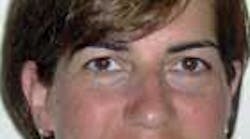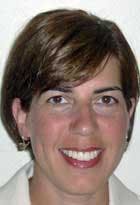by Ann-Marie C. DePalma, RDH, MEd, FAADH
As you review your next patient’s chart, you find that he is an 11–year–old boy. You think to yourself, "What a great age, this should be fun." This moment of pleasure lasts only a moment, however, as you read the boy’s medical history. He suffers from autism. You have heard about children with autism but have never experienced one. What do you do, and how do you treat him?
Karen Raposa, RDH, MBA, has a program for this situation titled, "Tips for Treating a Patient With Autism — The Experience of a Lifetime." The Centers for Disease Control and Prevention reports that one in 150 children born today has some form of autism, thus making the odds of encountering patients with the disorder high.
Karen Rapsoa, RDH, MBA
Autism is a disease that affects a person’s ability to communicate, socialize, and in some cases function independently. Karen believes that all dental professionals, hygienists, and dental team members need to better understand these patients and their unique abilities. The rewards of attending this course are found within each participant. Treating patients with any disability requires compassion, and Karen seeks that compassion from her participants.
As hygienists, our compassion and knowledge regarding oral health is a wonderful fit for working with the autism population. When a hygienist and dental practice provide a caring environment for patients with disabilities, the promotion of the practice goes beyond what any marketing campaign can achieve. According to Karen, "Patients don’t care how much you know, until they know how much you care." This caring and knowledge is provided throughout her program.
Karen provides an overview of patients with Autism Spectrum Disorders (ASD). She includes a review of how dental professionals can properly assess a patient’s abilities, techniques for treatment using the latest technology, and a comprehensive homecare regimen for patients/caregivers. Guidelines for incorporating these special patients into a practice are also included. The program can be given in two or three hours, depending on the audience’s needs, and is designed for all members of the dental team.
Karen’s journey into ASD began when her now eight–year–old son was diagnosed with autism just prior to his second birthday. She has become an "expert by birth." Her son is the joy of her life, but because of his condition, she has become an expert in autism in order to be a constant advocate for his personal and academic wants and needs. From her experiences she now educates dental professionals about this little known topic in professional circles.
A participant at one of her recent programs described it as "riveting," and said Karen openly discusses the challenges that she and her family face daily. After completing the program, one will never view autism through the same eyes again!
Karen provides participants with a patient information form that can be personalized and used immediately in practice. It may be simply copied and given to patients to complete so that the dental professional can learn more about the patient’s particular disability to provide the most appropriate treatment possible. In addition, Karen provides a list of resources that hygienists can refer to for specific information for their practice.
The programs are given with PowerPoint and embedded videos, case study discussions, group activities, and lots of heart–warming and entertaining stories about life with an autistic child. Karen is constantly on the move during the program, and actively engages the audience. Most participants wish the program was more than three hours!
Karen received her bachelor of science in dental hygiene from the University of Rhode Island and a master of business administration from the University of Massachusetts. While employed as an adjunct faculty member at Bristol Community College in Fall River, MA, Karen decided that she wanted to become involved as a corporate hygienist in sales and/or marketing.
Her first position in the corporate world came as an academic manager for Oral–B, where she handled sales and education to dental and dental hygiene programs and continuing education venues.
With her educational background, she quickly learned that public speaking was a passion. The fact that her son was diagnosed with autism simply gave her a topic to share with the dental community at large. Karen is currently senior manager of professional relations at Colgate–Palmolive.
In addition to the autism program, she presents programs for Colgate on chronic inflammation and the oral systemic connection, fluoride therapy and oral disease management, and vital tooth whitening.
Karen is passionate about caring for her family and providing autism education. She feels that if she can help even one family identify the early signs of autism in their child so that the child and family can receive help earlier, she has done something worthwhile. When she has time alone, which isn’t often, Karen enjoys reading a good novel and listening to jazz music.
She is a member of ADHA and is concerned about hygienists who are not members of their national organization. There is a significant difference between the percentages of practicing dentists who are members of ADA compared with practicing hygienists who are members of ADHA. Karen feels that without national representation the profession is at great risk.
Karen loves when her audience gets excited about something she has shared or that they can relate to with their own stories. Personal histories make the program come alive and bring about a change in participants’ beliefs and knowledge. If you participate in Karen’s program, the next time your schedule presents with a patient with autism, you will feel more comfortable in the knowledge that you can treat the person to the best of your ability.
For more information on Karen’s autism program or programs presented by Colgate, contact [email protected].
Author’s note: Karen and I are combining my recognizing childhood developmental delays program with her autism program to provide audiences with an enhanced all day program. For further information about the all–day program contact either Karen or I.
About the Author
Ann–Marie C. DePalma, RDH, MEd, FAADH, is a Fellow of the American Academy of Dental Hygiene, member of ADHA and other professional associations. Ann–Marie presents continuing–education programs for hygienists and dental team members and has written numerous articles on a variety of topics. She can be reached at [email protected].







